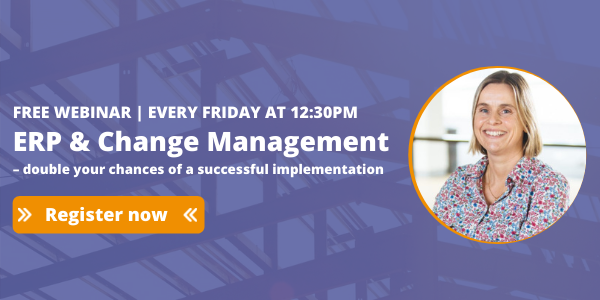We all know communicating significant change should be timely, relevant, and interesting. But what do you do when your project lasts 12m+, and means different things to almost everyone in the company? What if it is a little bland and goes through peaks and troughs of stakeholder involvement?
Indeed, mismanaged ERP communications can result in dragging users along the change curve, as opposed to supporting them. Or even worse, cries of ignorance come go live undermining business operations from day one… Avoiding these mistakes makes early establishment of an empowered change network essential.
Regular and incremental, rather than repetitive, communication through a variety of channels ensures messaging reaches all users. But leaning on an informed and empowered change network, who begin developing their own ownership of the change and implementation outcomes, enables that central messaging to be reinforced with more of a team specific slant. With the added benefit of filtering many of the questions and issues arising for the project team!
What is ERP Implementation and Why is it Important?
ERP implementation is the process of installing and configuring an Enterprise Resource Planning system for use in an organisation. This comprehensive software solution streamlines business operations, improving efficiency and productivity. An effective ERP implementation can revolutionise your company’s workflow, enhancing communication, collaboration, and decision-making.
Partnering with a seasoned ERP implementation consultant ensures a smooth transition, minimizing disruptions and maximizing ROI. Investing in top-notch ERP implementation services guarantees that your system is tailored to meet unique business needs, setting you up for long-term success.
Explore our ERP Implementation services at Nine Feet Tall.
Effective Communication Strategies for an ERP Implementation
In devising effective communication strategies for an ERP implementation plan, an ERP implementation consultant often leverages various tools. One such method, advocated by Mayfield (2013), involves employing a stakeholder radar chart. This tool aids in mapping out communication frequencies and levels of detail required for different stakeholders. By categorising stakeholders into ‘Vital to engage,’ ‘Necessary to engage,’ ‘Good to have on board,’ and ‘Courtesy to inform,’ ERP implementation services can tailor communication approaches accordingly.
The Mayfield stakeholder radar chart acts as a blueprint for determining the depth and regularity of interactions, ensuring vital stakeholders are deeply engaged while providing necessary information to others. This strategy fosters alignment, secures crucial buy-ins, and maintains transparency throughout the ERP implementation process. Ultimately, it streamlines communication efforts, enhancing the efficiency and success of the project.

Additional Testing and Training Tips
The involvement of an ERP implementation consultant within the ERP implementation life cycle holds pivotal expectations and influences the wider success of the project. Their role spans beyond mere participation, contributing significantly to the project’s benefits. Engaging them in advance ensures heightened interest, rendering them more receptive as listeners, testers, and learners. This proactive engagement strategy mitigates resistance to change, particularly when managing peer dynamics.
The timeliness and format of data provision bear immense importance, directly impacting colleagues and external stakeholders. Preparing them beforehand for the extent of their involvement maintains crucial goodwill and minimises disruptive surprises. Certainty proves more beneficial than prematurely unsettling stakeholders.
Amidst the broader business landscape, assurance regarding the investment’s contribution to growth is essential. Reinforcing key messages while emphasising individual impacts through storytelling, using real employee narratives and visuals, bridges the gap between the project’s technicalities and its human-centric benefits. This approach engages distant stakeholders by showcasing the tangible, yet intangible, positive transformations. Just as in advertising, storytelling resonates and brings relevance to distant audiences.
How Do You Know if Your ERP Communication Plan is Getting the Message Across Effectively?
Within the ERP implementation life cycle, an ERP implementation consultant faces the challenge of discerning disengaged stakeholders amid active engagement. Continuous public feedback requests may not effectively pinpoint disinterest. To gauge communication effectiveness, frequent, concise pulse surveys, ensuring anonymity, prove invaluable. These surveys, incorporating consistent questions, act as a reliable metric for assessing alignment with planned communication phases.
Moreover, involving specific teams or departments enhances the identification of critical areas needing intervention. Acknowledging that absence of feedback is feedback itself, these pulse surveys become instrumental in uncovering hotspots or potential issues. This approach empowers ERP implementation services to adapt strategies and ensure comprehensive stakeholder engagement and alignment throughout the project phases.
If communications are holding back the success of your ERP Implementation, get in touch so that we can make sure that your people feel informed, equipped, and valued. Contact EstherM@NineFeetTall.com
Why Choose Us?
Choose us for your ERP implementation journey because we’re committed to ensuring seamless communication strategies throughout. Our expertise lies in tailoring ERP implementation services to your unique needs. With a proven track record, we excel in engaging stakeholders effectively, using innovative tools and strategies. We prioritise your project’s success by navigating complexities with clarity, ensuring every phase aligns with your communication goals. Trust us to drive your ERP implementation with precision and a keen focus on fostering collaboration and success.
Get in touch with us today.






